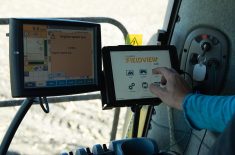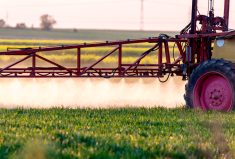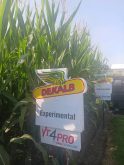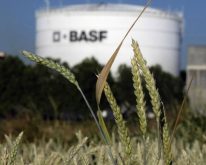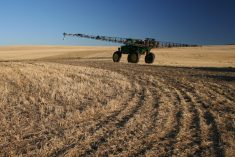Chicago | Reuters — Bayer launched a pilot program in the United States and Brazil on Tuesday that will pay farmers for capturing carbon in cropland soils, making it the latest agriculture company to capitalize on environmental initiatives.
The company seeks to enroll about 1,200 row crop growers in its Bayer Carbon Initiative in the first season, scale up in upcoming seasons, and ultimately expand to other countries, company executives said.
In Brazil, Bayer expects to invest five million euros (C$7.76 million) via the program over three years, the company said in a separate statement in Portuguese. Executives declined to disclose the overall program cost in both countries.
Read Also

Trump tariff on Brazilian goods could jack up U.S. burger price
U.S. President Donald Trump’s plan for a 50 per cent tariff on goods from Brazil will likely raise prices for the beef that is used in American hamburgers, traders and analysts said on Thursday, as food manufacturers increasingly rely on imports during a time of declining domestic production.
A Bayer representative said via email the pilot “will help inform us on how we can take this program forward in other parts of the world — including Canada.”
The program is the latest in a string of recent environmentally focused initiatives by agriculture companies, which have been criticized for using harmful chemicals and not doing enough to stop deforestation in Brazil.
Global commodities trader Cargill kicked off a project this spring targeting greenhouse gas emissions and fertilizer runoff in Iowa, while agricultural co-operative Land O’Lakes last week announced a multi-year partnership with Microsoft to tackle sustainability and technology goals in the food system.
The announcements came after the U.S. Treasury Department in May clarified a federal tax credit designed to spur investment in carbon capture and sequestration projects.
Bayer’s program requires that farmers enroll in its Climate FieldView digital farming platform, where growers would log data about their eco-friendly farming practices such as no-till farming or planting cover crops. Those claims could then be verified by satellite imagery.
Bayer would compensate growers for sequestering carbon and pay them in cash or credits to buy products on its Bayer Plus rewards platform.
“If farmers are sequestering carbon to the benefit of society and the planet, they should to be rewarded for it,” Brett Begemann, chief operating officer of Bayer’s Crop Science division, told Reuters.
In Brazil, the company selected roughly 500 farmers in 14 states to participate, starting in the 2020-21 crop season with about 60,000 hectares of mainly soy and corn farms.
Begemann said the value of the carbon sequestered would be dictated by the market.
“At the end of the day, we have to have a clear line of sight that this has to contribute to Bayer’s bottom line and benefit our share owners as well.”
— Reporting for Reuters by Karl Plume in Chicago; additional reporting by Gabriel Araujo in Sao Paulo. Includes files from Glacier FarmMedia Network staff.




